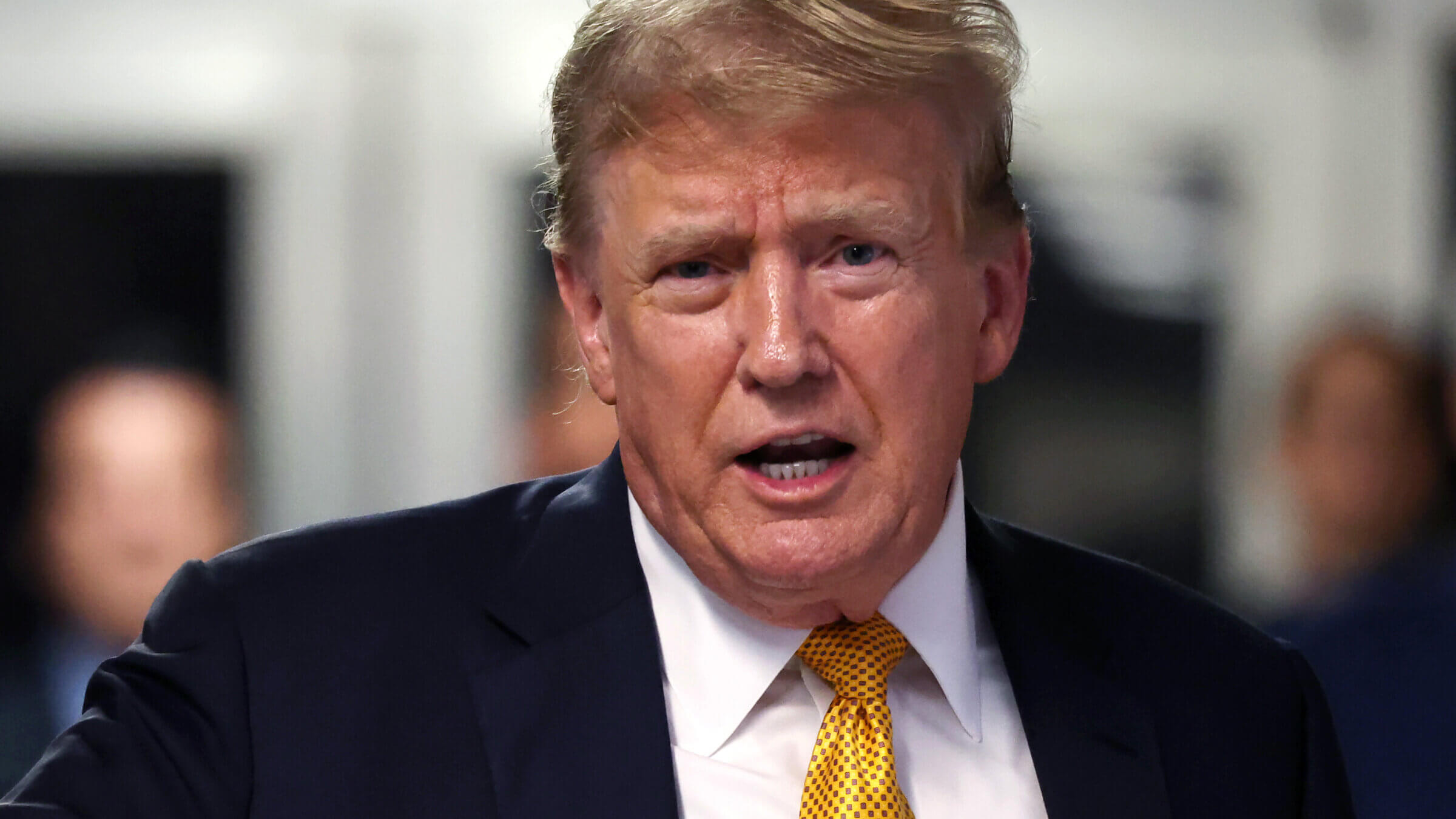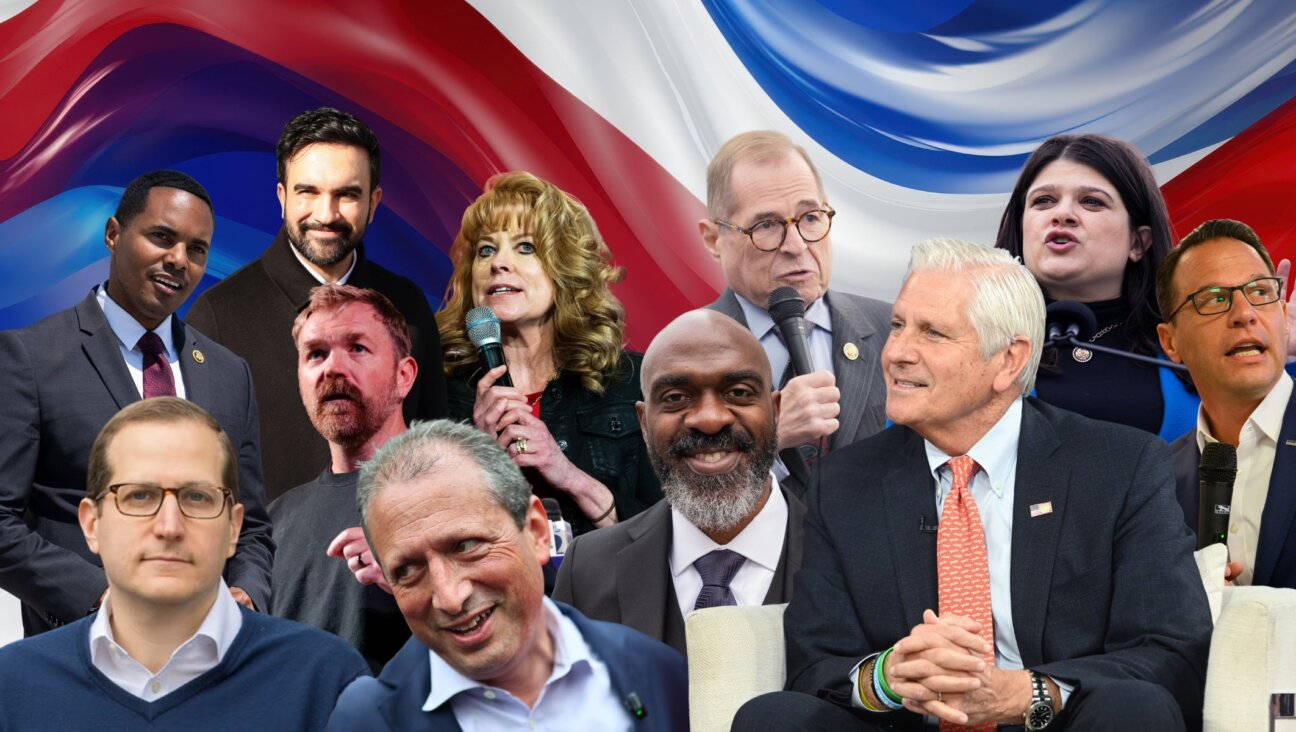Every time Donald Trump has invoked Hitler and the Nazis
Trump’s alleged comment that ‘Hitler did some good things’ and his admiration for ‘German generals’ are making headlines

Former President Donald Trump. Photo by Michael M. Santiago/Getty Images
Former President Donald Trump’s purported admiration for all things Hitler is making headlines again.
John Kelly, Trump’s former White House chief of staff, reiterated his assertion that Trump said, “Hitler did some good things, too,” in a story published Tuesday in The New York Times.
Kelly is also quoted in a story published Tuesday in The Atlantic discussing Trump’s purported comments about “German generals.” The magazine quoted a 2022 book, The Divider: Trump in the White House, that said Trump had asked Kelly, “Why can’t you be like the German generals?”
Kelly told The Atlantic that he responded: “Surely you can’t mean Hitler’s generals? And he said, ‘Yeah, yeah, Hitler’s generals.’” The magazine also quoted two unidentified sources saying Trump once said, in a private conversation in the White House, “I need the kind of generals that Hitler had.”
Trump is seeking reelection to the presidency in a neck-and-neck race with his Democratic opponent, Kamala Harris. His campaign said all these reports of Trump’s comments were false. But Trump’s interest in and reported admiration for Hitler and Nazi Germany have repeatedly surfaced over the years.
Here’s a timeline of known instances in which Trump has invoked Hitler and the Nazis, vaguely or explicitly, since the start of his political career.
July 14, 2015: Trump tweets picture with SS soldiers in background
About a month after he officially launched his 2016 campaign, Trump took to Twitter, then his favorite social media platform, to post an image of his face overlaid by the American flag, with marching soldiers Photoshopped in the background, hashtagged, “Make America Great Again.” But the image of those soldiers turned out to be taken from a stock photo of World War II reenactors in Nazi uniforms.
The Trump campaign deleted the tweet and blamed the incident on “a young intern.”
March 8, 2016: Trump responds to “Hail Trump” calls and Hitler comparisons
By March 2016, Trump had won state primaries in South Carolina, New Hampshire and Nevada. Political and cultural figures had begun to take his candidacy seriously, and some of them, urging Americans to recognize the extremism of his campaign promises — such as the creation of a registry of all Muslim Americans — began likening him to Hitler. Among those to draw that comparison were the comedian Louis CK, former Mexican president Vicente Fox, and Anne Frank’s stepsister, Eva Schloss.
Meanwhile, neo-Nazis who supported Trump were openly cheering him on with language that evoked Hitler. Some began calling out “Hail Trump” at rallies. And Trump had begun asking supporters at his rallies to hold up their hands in a pledge of allegiance to him, a practice that some said evoked Hitler’s rise to power.
Trump called the controversy “ridiculous” and said he was unaware that public figures had been comparing him to the Nazi dictator.
“I don’t know about the Hitler comparison,” he said on ABC’s Good Morning America. “I hadn’t heard that, but it’s a terrible comparison. I’m not happy about that certainly.”
Jan. 11, 2017: “Are we living in Nazi Germany?”
Shortly before his inauguration, Trump tweeted that question in response to circulating reports that the U.S. intelligence community had gathered compromising personal information about him. “Intelligence agencies should never have allowed this fake news to ‘leak’ into the public,” he wrote. “One last shot at me. Are we living in Nazi Germany?”
https://x.com/realDonaldTrump/status/819164172781060096
Jan. 19, 2017: Sebastian Gorka, top Trump aide, appears on Fox News wearing Nazi gear
On the eve of Trump’s inauguration, Gorka, soon to be appointed deputy assistant to the president, wore the badge, tunic and ring of the Order of Vitéz, a Hungarian organization that, according to the U.S. State Department, was “under the direction of the Nazi government of Germany” during World War II. This led to accusations that Gorka himself was a Nazi sympathizer. A Forward investigation later revealed Gorka’s ties to antisemitic Hungarian groups.
Gorka served in the Trump administration for about six months before resigning.
2017-2020: Trump compares his crowd turnout to Hitler’s (twice)
Obsessed with the size of his audiences since his inauguration — he reportedly had a photographer edit a picture of the crowd that day to crop out the empty space — Trump is said to have bragged that his ability to draw a crowd impressed German Chancellor Angela Merkel.
According to Jonathan Karl, author of Tired of Winning: Trump and the End of the Grand Old Party, Trump boasted to members of Congress on two separate occasions that Merkel had said she was “amazed” by the number of people who came to see him speak. “She told me that there was only one other political leader who ever got crowds as big as mine,” Trump allegedly said. The other political leader was implied.
Karl’s book also reports that Trump was said to have lamented that his staff were not as ‘loyal’ to him as the Nazis were to Hitler.”
June 18, 2020: Facebook takes down Trump ad featuring Nazi symbol
A campaign ad posted from the Team Trump Facebook account, claiming that dangerous far-left groups were “destroying our cities” was accompanied by an image of an inverted red triangle. The campaign claimed Antifa used the symbol. But others pointed out that Nazis used it to identify enemies such as communists. The campaign took down the ad after about 24 hours.
November —December, 2023: “I’ve never read Mein Kampf”
In separate campaign speeches, Trump called his political enemies “vermin” and said immigrants are “poisoning the blood of our country.” The descriptions evoked language used by Hitler to describe Jews. Afterwards, the Biden administration alleged Trump was “parroting Adolf Hitler.”
Trump responded to the charges at a Dec. 20 rally. After repeating the phrase that immigrants were “poisoning the blood of our country,” he riffed, “They said Hitler said that.” He then said Hitler used the words in a much different way, before adding, “It’s true. They’re destroying the blood of the country, they’re destroying the fabric of our country, and we’re going to have to get them out.”
He added, “I’ve never read Mein Kampf.”
March 2024: John Kelly says Trump said “Hitler did some good things”
Kelly, Trump’s former chief of staff, has raised alarms about the former president during his 2024 campaign, including by claiming that Trump told him “Hitler did some good things.”
“He said, ‘Well, but Hitler did some good things,’” Kelly told CNN’s Jim Sciutto. “I said, ‘Well, what?’ And he said, ‘Well, [Hitler] rebuilt the economy.’ But what did he do with that rebuilt economy? He turned it against his own people and against the world. And I said, ‘Sir, you can never say anything good about the guy.’”
Kelly reiterated the assertion in an interview published by The New York Times on Oct. 22, 2024.
“It’s pretty hard to believe he missed the Holocaust, though, and pretty hard to understand how he missed the 400,000 American GIs that were killed in the European theater,” Kelly added.
May 4, 2024: Trump calls Biden presidency a “Gestapo administration”
In an audio recording obtained by The New York Times, Trump told an audience of Republican donors that Biden is running “a Gestapo administration.” The Gestapo were the Nazi police.
May 21, 2024: “Unified Reich”
In a full-circle moment recalling the Nazi soldiers’ campaign flub in 2015, a Trump campaign post once again allowed Nazi imagery to slip into the backdrop. Trump’s Truth Social account re-shared a video praising Trump that used faux newspaper clippings as background art; one of the clippings, praising a “unified Reich,” was lifted from a Wikipedia article about World War I.
The video appeared to be made by a meme creator whom the Times reported has collaborated with the Trump campaign in the past. But the Trump campaign’s press secretary said it was “created by a random account online and reposted by a staffer who clearly did not see the word.”
June 23, 2024: ‘Ovens’ joke
In an appearance on MSNBC, a woman who worked for the Trump organization prior to his presidency recounted an offensive joke Trump once made to Jewish executives after hiring a German employee.
“We had just hired a residential manager, a German guy,” Barbara Res, who was the lead engineer on Trump Tower in Manhattan, said in the interview. “And Donald was bragging among — to us executives, there were four of us – about how great the guy was and he was a real gentleman, and he was so neat and clean. And he looked at a couple of our executives who happen to be Jewish, and he said, ‘Watch out for this guy – he sort of remembers the ovens,’ you know, and then smiled.”
During the Holocaust, the Nazis cremated corpses of Jewish people murdered in concentration camp gas chambers in custom-built furnaces.
“Everybody was shocked,” Res said. “I couldn’t believe he said that. But he was making a joke about the Nazi ovens and killing people, and that’s the way he was.”
Oct. 22, 2024
The New York Times quoted John Kelly, Trump’s former White House chief of staff, reiterating his assertion that Trump said, “Hitler did some good things, too.”
The Atlantic quoted two unidentified sources saying Trump once said, in a private conversation in the White House, “I need the kind of generals that Hitler had.”
The Atlantic also asked Kelly about a 2022 book, The Divider: Trump in the White House, that said Trump had asked Kelly, “Why can’t you be like the German generals?” Kelly told The Atlantic that he responded: “Surely you can’t mean Hitler’s generals? And he said, ‘Yeah, yeah, Hitler’s generals.’”
Trump’s campaign said all these reports of Trump’s comments were false.
















